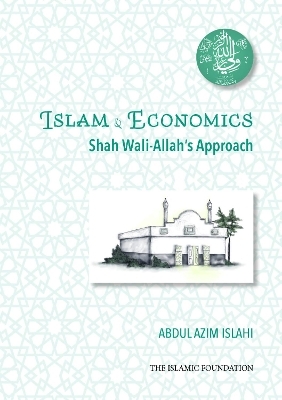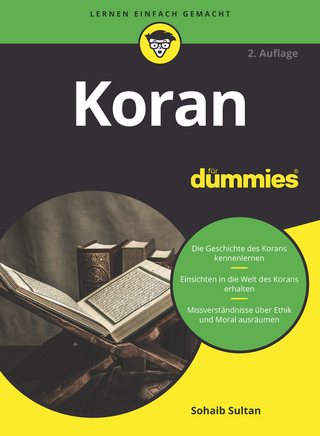
Shah Wali-Allah Dihlawi and his Economic Thought
Islamic Foundation (Verlag)
978-0-86037-851-8 (ISBN)
Shah Wali-Allah was a great sufi scholar born in the Indian Sub-Continent in the 1700’s. He had a deep understanding of Qur’an, Hadith and Fiqh. This book is unique as it focussing on Shah Wali-Allah’s thought from an economic perspective. Chapters discuss his economic ideas, his contribution to Tadbir al-Manzil (household management), money and interest, as well as public finance and socio-economic development.
Dr. Abdul Azim Islahi is a professor at the Islamic Economics Institute, Jeddah. He has spent more than 30 years in research, teaching and expanding the frontiers of the discipline of Islamic economics, King Abdulaziz University. He obtained his PhD from the Aligarh Muslim University, India in 1981
Introduction by Professor Khurshid Ahmad
Preface: 1 Overview of the Muslim Situation during Shah Wali-Allah’s Time
1.1 The World and the Muslim situation in 12th century AH/18th century CE
1.2 Important Muslim regions
1.3 Mughals and the emerging Indian Sultanates
1.4 Khanates in Central Asia
1.5 Muslim states in Far East Asia
1.6 The economic front
1.7 Awakening among the Ottomans
1.8 India of Shah Wali-Allah’s time
1.9 Medina becomes the foundation for revival and renovation
2 Shah Wali-Allah Dihlawi: Life and Times
2.1 Times and environment
2.2 Life
2.3 Areas of major contributions
2.4 Political role
2.5 His death and resting place
2.6 Impact of Shah Wali-Allah
2.7 Shah Wali-Allah—a parallel to Ibn Taymiyyah
3 Intellectual and Academic Heritage
3.1 Shah Wali-Allah’s syllabus—an academic legacy
3.2 Sources of Shah Wali-Allah’s thought
3.3 Was Shah Wali-Allah influenced by Ibn Taymiyyah and his student Ibn al-Qayyim?
3.4 Introducing Shah Wali-Allah’s works
3.5 The impact of Shah Wali-Allah’s ideas—factors that led to the fast and vast spread of his works
4 Economic Ideas of Shah Wali-Allah Dihlawi
4.1 Economic ideas in Shah Wali-Allah’s works
4.2 Study of applied economy
4.3 Theoretical economic ideas
4.4 Economic activities in an Islamic framework
4.5 Measures to avoid disputes in economic transactions
4.6 Some major contributions
5 Tadbīr al-Manzil (Household Management)
5.1 Origins of tadbīr al-manzil
5.2 Tadbīr al-manzil in the Islamic tradition
5.3 Shah Wali-Allah on tadbīr al-manzil
5.4 The subject matter of tadbīr al-manzil
5.5 Other areas of tadbīr al-manzil
5.6 The present discipline of economics and the Greek oikonomia
5.7 Market versus ‘family’
6 Shah Wali-Allah on Money and Interest
6.1 Money as seen by the Greek philosophers
6.2 Money in the early period of Islam
6.3 Difficulties of the barter system
6.4 Functions of money
6.5 Is it must to use gold and silver as money?
6.6 Interest—an ill-use of money
6.7 Ribā (interest proper)
6.8 Is the charging of interest prohibited from the poor only?
7 Public Finance
7.1 The subject of public finance—first to attract attention
7.2 Public revenue
7.3 Economics of zakah
7.4 Public expenditure
7.5 Public borrowing
7.6 Concern for the poor
8 Shah Wali-Allah on the Stages of Socio-Economic Development
8.1 Early Muslim scholars’ holistic approach to development
8.2 Development role of the state
8.3 Ibn Khaldun’s cyclical model of development
8.4 Shah Wali-Allah’s theory of socio-economic development
8.5 Irtifāqāt: a natural process in human development
9 Conclusion: Comparison and Evaluation
Bibliography
Arabic References
Other Languages
Indexes
Names
Subjects
| Erscheinungsdatum | 13.10.2022 |
|---|---|
| Zusatzinfo | Color illustrations throughout |
| Verlagsort | Markfield |
| Sprache | englisch |
| Maße | 132 x 210 mm |
| Themenwelt | Geisteswissenschaften ► Religion / Theologie ► Islam |
| Wirtschaft ► Allgemeines / Lexika | |
| Wirtschaft ► Betriebswirtschaft / Management ► Finanzierung | |
| Wirtschaft ► Volkswirtschaftslehre | |
| ISBN-10 | 0-86037-851-9 / 0860378519 |
| ISBN-13 | 978-0-86037-851-8 / 9780860378518 |
| Zustand | Neuware |
| Informationen gemäß Produktsicherheitsverordnung (GPSR) | |
| Haben Sie eine Frage zum Produkt? |
aus dem Bereich


